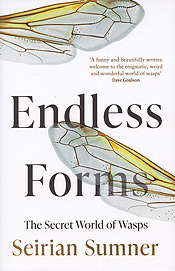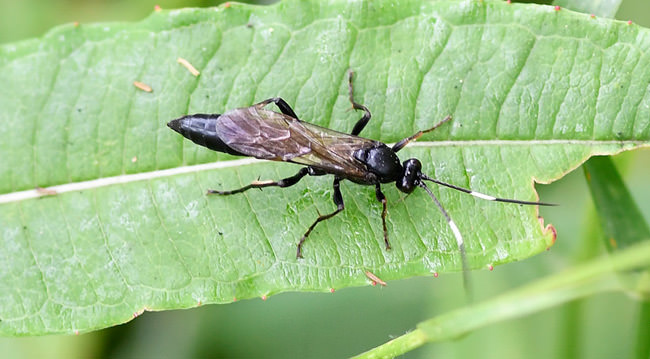
Esoteric subjects need enthusiastic guides, and one might struggle to find a guide with as much fizz and crackle as Professor Seirian Sumner (at UCL), author of Endless Forms - The Secret World of Wasps. Most readers might be pre-indisposed to the subject anyway. “Wasps”, as the old French quip goes, “are merely proof of the non-existence of God”. Their stings are infernal and, as the good professor repeatedly tells us, they have a habit of being wielded on picnics. Yet, I’m happy to admit that I am now tempted to give them a pass and set aside the fly swat.
After 342 pages of thoroughly enjoyable, esoteric stuff, I absolutely get the following:
Without the endless forms of wasps as hunters, parasites, pharmacists, chemists, toolmakers, negotiators, superorganisms, architects and defectors, we would wrongly believe humans to be the most complex and intriguing organisms on the planet.
This is a claim that makes perfect sense, coming as it does at the end of the book. All the attributes that make these claims pertinent, the author has guided us to consider in a steady case-by-case process of advocacy. In the same vein, the sentence that follows it also makes perfect sense as a summation of these creatures’ capabilities:
Without the services of wasps as pest controllers, pollinators, seed-dispersers and decomposers, our forests, grasslands, parks, gardens, deserts, highlands, moorlands and heathlands could not support planetary health in the way they currently (just about) do.
These big claims stand, beautifully supported by this wonderful book, delivered with flair and panache. There are lacings of anthropomorphism, dollops of smut, and a writer’s careful craftiness and craft in getting us to stick with the project and do the detail. If you really wanted to learn about wasps, this non-guidebook is the one for you. If you happened across it with only mild curiosity, venturing into it as if it were an open jar of marmalade, you’d not get out until you’d consumed the lot and come up grinning. Endless Forms is one of those rare books that can sugar a pill so sublimely that you’ve no idea you’ve even popped it in your mouth, swallowed it and shaken off the fever. Heavens, the good professor even cracks a couple of bottles of Limnio wine with Aristotle over an imagined dinner that runs to a cracking 70 pages. Imagination is as important as fact, you see.
The subject, I now admit, is inherently interesting. “Bees are simply wasps”, we are told, “that have forgotten how to hunt” and “the first ant was a wasp that lost its wings”. So wasps pre-date the other two and win in the seniority stakes. It’s not just lineage that wasps have; there’s variety too. There are ‘just’ 13,000 species of ant globally, a ballooning 20,000 species of bee, but a whopping 100,000 known species of wasp … that might in fact turn out to be several million undescribed species. Nobody knows. Endless forms indeed.
In the interest of transparency, I had been hoping that, amongst other things, Endless Forms might have shed some light on ichneumon wasps, particularly on resources that might have helped me identify which species these two might be:


But that didn’t happen. I did learn that there might be 160,000 different species of parasitoid wasps, a group to which the ichneumons indeed belong, and I did learn the difference between sawflies and ichneumons. The former might number 8,000 different species, but none of them have the wasp waists that the ichneumons certainly do, a distinction that can usually be made in the field in spite of their small size. Non-stinging sawflies are the ancestors of wasps and can be thought of as the ‘original wasp’. In evolving away from sawflies, wasps shed “the clumsy, thick-waisted fashion so adored by sawflies” and “afforded wasps manoeuvrability of their derrières”. Indeed, check out YouTube videos on the phenomenal flexibility of the ichneumon’s long ovipositor. These instruments are capable of injecting eggs, venom and a virus that suppresses the host’s immune system - all in one go. They can also be eight times the length of their bodies.
New learning cascades onto the reader at every page turn. The detail is a thrilling as the wasp variety that the author describes. Pity other invertebrates; every species of caterpillar, fly and beetle probably has at least one parasitoid wasp that exploits it. After all, stinging wasps have been evolving for perhaps 190 million years, refining their venom and their sense of smell as they go. We find some of their venom to be useful in treating rheumatoid arthritis and tendonitis; and we know that some parasitoid wasps can detect methyl benzoate (the volatile component of cocaine) at concentrations as low as three parts per billion. They are now used as sniffer wasps on the lookout for drugs, dead bodies and explosives.
As if all of this isn’t enough, the author reels out some truly astronomical numbers of insect and invertebrate groups that social wasps consume in a season, demonstrating their value as pest controllers. Their instinctive smartness and speed (admittedly at performing a very narrow range of tasks) can only make us grateful that most wasps are small. Scale them up to something dog or cat size (as they might have been in the ancient past) and we’d all be living in a horror film.
Perhaps not surprisingly, the bee cousins of the older wasp get good coverage in this book. I honestly did not know that the hairs on bees are positively charged, helping them collect negatively-charged pollen from flowers. Perhaps wasps are so endowed (many are pollinators, so why not?) although that has not yet been established. Professor Sumner also has a trenchant section on the “devastating” hit on the diversity of native pollinators when honeybees are introduced into an area. “The honeybee”, she observes, “is the cow of the insect agricultural world”.
Endless Forms is a fine, easy read by a respected scientist with an authoritative research pedigree. We should be pleased that such a highly-regarded academic also turns out to an engaging writer.
[Endless Forms - The Secret World of Wasps by Seirian Sumner is available in the UK from Hive.co.uk.]
